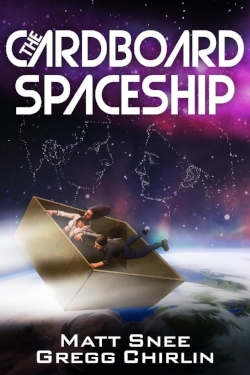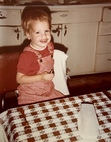Matt Snee's Blog, page 93
May 30, 2017
Writing about History
I am an innately curious person. I am fascinated by a great many things, especially history. I read books from the past, and new books about the past. It astonishes me how many people don't. It realy teaches you a lot about society and how for most of civilization's duration, people have been dealing with the same problems every generation. We leave monuments and ideas behind when we die, and new generations take them up, but most human dramas are the same as they were two thousand years ago.
Specifically, I have been researching a few certain things. First, I've been reading Annie Proulx's "Barkskins," about a family of lumber traders over the course of a couple generations. Fascinating stuff. In addition, I have been doing research on the Byzantine empire, the Eastern Rome that has been mostly forgotten about by the West. This research is for a story I've been considering that tells the tale of the empire from the beginning to its end, through the eyes of a time traveller and his guide, a vampire.
Now this is important: for my own work, I have a hard time writing about the past without having time travel being involved. I feel that the eyes that help narrate the story have to be from our own time, for it to make sense. I don't know why.
Last year I finished a novella about a Batman-like character, who I call Night Shepherd, travelling back in time to try to save King Arthur. This story was perhaps a major landmark in my career, and I heavily researched it, reading about five or six Arthur books before I wrote it. Writing this was a revelation in more ways than one.
I've also been thinking about doing a Viet Nam story, but again with the twist of time travel. I don't know why - I was just sitting there the other day and said to myself: I'm going to write a Viet Nam story.
Anyway, maybe my technique of having time travel involved wil get more readers to understand my presentations of these periods of time. History is long. There have been many things that happened that people just forget and neglect. I don't understand it.
May 24, 2017
Your Dream of Dark Angels

Today I wanted to discuss and describe my current project, "Your Dream of Dark Angels." I've nursed it for about five years, but I've decided to finally finish it if I can.
The story imagines what it might be like for a young Bruce Wayne / Batman, here named "Lucas Watts" so to not interfere with DC Comics, and also to declare he's mostly my own creation.
Lucas is fifteen when the story begins, in the angst of high school, and trying to find himself as a person and his place in the world with his unique heritage and situation. He wants to fix the world, but he doesn't know how - but he does believe no one else is willing or has the power to do it, and he DOES.
In the beginning of the story, the father of one of his good friends at school is found dead, and while it is declared suicide, Lucas isn't so sure, and thus the rest of the story begins.
There's no caped crusader or batman or any "vigilante" that truly makes an appearance here. It is more Lucas's story rather than anything else, though when he goes on some adventures, he calls himself, "The Monstrous," a creature manufactured to strike fear in the hearts of those who do evil in one way or another.
I mix in a lot of ideas into the soup of the story, with examinations of Hamlet (Lucas is the Anti-Hamlet), old Roman Skepticism, asceticism, the question of justice, etc. etc.
It's really an exciting project, and I'm not sure how long the final result will be, maybe 200 pages, I don't know. But it's certainly capturing my attention right now.
My friend Gisella also did illustrations for it, one of which is above. It's a great project. :)
May 3, 2017
What HAS Snee Been Up To?
Well, for one thing, I finished my 178 page epic poem, "Evil Land," and polished it with my editor, Clare. Now I've submitted it to a couple contests out there. I'll self-publish it eventually if there are no takers, I just feel I oughtta try the old fashioned way for poetry. I have a couple other chapbooks out at contests too... I was really productive this winter, and I'm only now starting to realize it.
Otherwise, I have been working on a top secret project - an interactive novel / story-driven video game. It's called "Forgetter".
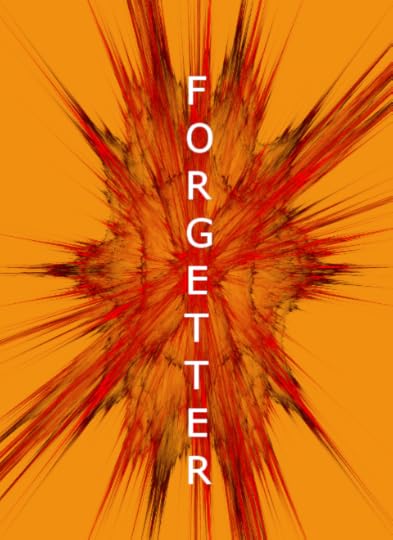
In it, you play as a ghost in the afterlife who has forgotten who you were when you were alive, and your quest during the game is to remember. I've been nursing this idea for about five years, and one day about a month ago, I said to hell with it, I'm doing it.
A month of 16 hour days later, the game is almost finished. Still a lot of work left, but I've gone over the hill and its downhill from here.
THe game is nonlinear, and you can explore however you like, and most of it is just conversing with strange characters who are also ghosts as you try to solve your quest. It's quite cool!
I've attached some screenshots below for your perusal. I've done everything in this game myself, the images, the music, the story, the programming, everything. It's a lot of work!


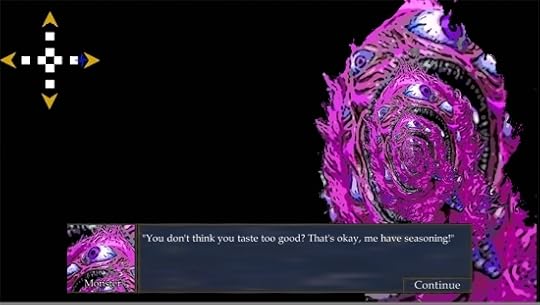

March 17, 2017
Meet Author Kenna McKinnon!!
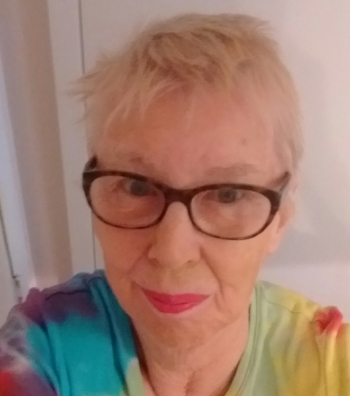
Who’s your favorite author?
I have so many, but I would say that John Steinbeck, the American author of Grapes of Wrath and Of Mice and Men, is one of my favorites. I also love Alice Munro, the Canadian author – her book of short stories, A Bird in the House, was one of my high school required reading texts. Margaret Laurence may be my favorite author. My son once gave me a set of her books. The Prophet’s Camel Bell, nonfiction, and written during her stay in Africa with her engineer husband, is another of my favorites. Margaret Atwood also is excellent. Her prophetic book, The Handmaid’s Tale, has been made into a movie as well, I believe, but The Edible Woman is another I enjoyed, as well as Penelope, a modern retelling of the Odysseus story.
Which book or books have most informed you as a writer?As a writer, I have been influenced by female literary writers and poets as well as the science fiction greats such as Robert Heinlein, Arthur C. Clarke, Isaac Asimov and so on. My father read these books and I was exposed to them at a young age. My son also liked the same sort of traditional science fiction. Greg Bear’s book Eon and William Gibson as an author also informed me as a writer, I believe. That doesn’t really answer your question, but the most influential book as a writer may have been a little known and short book I read about 40 years ago called Journey to Arcturus. The Anne of Green Gables books also influenced me as a young girl, and Emily of New Moon. So many.
When did you realize you wanted to write?Ever since I can remember. I was able to print little poems and stories when I was about five and started then, and before that, I’d entertain my brothers and sister with stories I’d tell them before bedtime or on the way to school. All I ever wanted to be was a writer as a young girl, and thought that a journalist would be a worthy occupation. However, I didn’t follow that career path and wasn’t published until fairly recently.
What was your last completed project?A paranormal/fantasy book called Den of Dark Angels. It’s a collection of three novellas now published by Creativia.
What are you working on now?My WIP is an adult fantasy called Engaging the Dragon. A sort of an adult fairytale, set on an alien planet, complete with dragons and a princess, and a handsome prince.
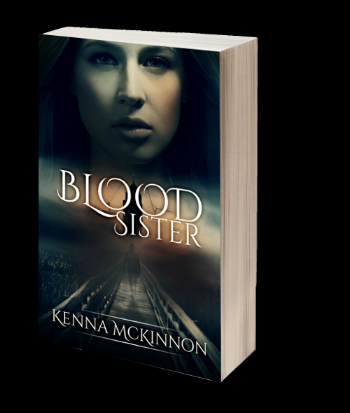
What is your writing “process” typically like?
I am very unorganized in my writing and often write for long hours late at night, or go for several weeks or even months without writing. I write at a PC, not a laptop, by a window where I have my desk set up. Sometimes I listen to music. I’m quite a fast typist but will write out scenes in longhand on yellow lined paper if I’m stuck for a scene or something that comes to me quickly, for example, in the night, and I want to get it down. I’ve begun to make outlines though I don’t usually write the synopsis until the book or story is finished. I make notes and do research on line or sometimes glean from real life what I want to describe, but I use my imagination more than facts as I often write fantasy or SF, though a reader gave SpaceHive 2 stars at one time because of factual errors. I’ll sit down with a cup of tea and don’t set aside any specific length of time to write. I write from an outline now more than I used to. Sometimes I’m quite prolific.
How do you combat writer’s block?I seldom have writer’s block but when I do, I simply write nonsense or a lot of swear words to get me going, and make sure it’s all typed down and then it sort of automatically goes into writing mode and I can break the writer’s block. But writer’s block doesn’t happen often, I suppose because I don’t have concrete times to write. If I don’t feel like writing I often don’t. I’ll go out for walks, too, listen to music, or a really good method is to read someone else’s book in the same or a different genre.
Where do your ideas come from?My head and my life experience, reading, talking to people, I don’t think any authors have a dearth of ideas. They are always there.
What’s your greatest challenge as a writer?Making time to market my books and stories. I just am a complete suck at promotion, though I’m making a real effort lately to get in the game.
And what has been your greatest triumph (so far)?Being accepted by a small press after working with the publisher on an idea for my first novel, SpaceHive, which was originally written after a friend was stung by wasps in her garden. I began to wonder, what if they were huge alien wasps out to conquer Earth, and someone was immune to the stings, and the book evolved from there. I approached the publisher with the draft and she had had a dream the night before about bees, so was more interested in my concept, I think, because of the dream and it was coincidental that it should happen then. That was the first book I’d had accepted, and it was while I was still in my sixties or late fifties. It has since been republished by Creativia. I initially called it The Jive Hive. My original publisher suggested a name change.
Thanks Kenna!!!
March 16, 2017
How Fan-Fiction Saved My Writing
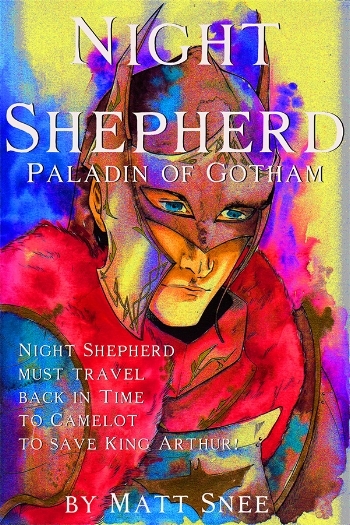
For years I tried to make a dent in the fickle and derivative indie lit scene. My mistake was trying to write stories that hadn't been written before, and mostly using pre-created characters, celebrities, and myths. It was a weird dichotomy. I wrote about sports stars, Big Bird, Cobra Commander, Dolph Lundgren movies, Transformers having sex with each other, and crack-addicted homosexual video game characters.
Nobody cared. I was trying to do something new, but in the scene's defense, my stories weren't very good. I wrote perhaps twenty bad stories, and finally gave up. I went back to novels for a while. Even now, I have a problem writing something less than 80 pages or so - I like the middle-sized form of novels and novellas rather than big books or shorts.
I couldn't find myself as a writer. I had definite ideas, but I didn't know how to realize them. Most of all, I didn't know how to write my stuff because I didn't know how to be me, or what that meant.
But around 2013 I had a breakthrough. I was thinking about Batman a lot, and lo and behold, a strange idea came into my head: Batman as time traveller, sent back to rescue King Arthur. It's a totally nutso idea, and I loved it immediately.
Not only could I write about a character I was obsessed with, without having to say anything "literary", but I was also able to research the Arthurian myth to do so, and I LOVE research. I must have read five or six King Arthur books to write that 80 page story.
Ultimately, I spun my own version of Batman, and my own version of King Arthur, a potent combination that still thrills me.
But most importantly, I found who I really am as a writer. I don't know how - but for some reason, this story marked a new level in my writing. It is so pure, intense writing, absent of the desire to impress anyone but myself. That was a big milestone.
The story is called "Paladin of Gotham," and I have since reconfigured it so it doesn't use the "Batman" name or accoutrements, and now has a character named "Night Shepherd" instead. Now it is truly mine.
But I found myself through fan fiction, whether it was with those earlier, terrible stories, or finally with "Paladin of Gotham," that's how I taught myself how to be... me.
March 12, 2017
Meet Author Susan-Alia Terry!!!
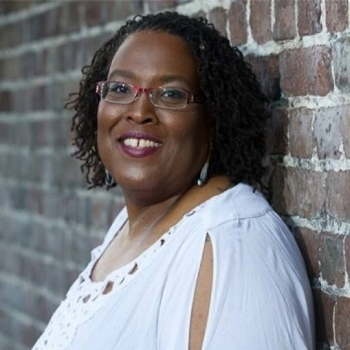
Who’s your favorite author?
I like a lot of authors, but Stephen King is probably my favorite, with Clive Barker a close second.
Which book or books have most informed you as a writer?Probably The Books of Blood, The Great and Secret Show, and Imajica by Clive Barker. His ability to walk through different worlds is so amazing to me.
When did you realize you wanted to write?After I completed my first National Writing Month. I did it on a whim and it was such a rush! Writing still is a rush!
What was your last completed project?Coming Darkness (http://mybook.to/ComingDarkness) is my most recent release.
What are you working on now?The follow-up to Coming Darkness. The plan is to complete the initial story and then branch out with stories within the universe.
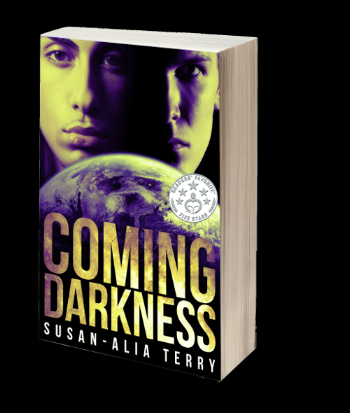
What is your writing “process” typically like?
I start with an idea that expands as I begin to write. For instance in Coming Darkness the initial idea was of a Lucifer that had never been to hell. What does that look like? Who is he? Then it spirals out from there. Why hadn’t he been to hell? How did we humans learn a story about him that isn’t true? All the little components then attach themselves like pieces of a jigsaw. And like jigsaw pieces there’s bunches that seems to have no connections – those either fit into the current story or coalesce into another one.
How do you combat writer’s block?Do not pass Go! Do not collect $200! Seriously, the best thing to do is redirect. For me that’s watch a movie, take a nap, play a video game, take a walk, etc. Anything that occupies my active, conscious mind and allows the story to simmer quietly in my subconscious. Forcing it never works. Either I write what I don’t want and have to delete, or I manage to write a paragraph of questionable usefulness while beating myself up the entire time. Redirecting is healthier and ultimately more productive.
Where do your ideas come from?The ‘woo-woo’ answer is the Great Subconscious – the Great Collective. Every thought ever thought and yet to be thought. The material, practical answer I suppose could be my ability to ask fantastical questions, especially of things we already think we know the answers to.
What’s your greatest challenge as a writer?To stop comparing myself to other writers, especially those whose talent I admire, but also those who are more successful than I am.
And what has been your greatest triumph (so far)?Releasing my first book! Holding a physical copy of my first book – the culmination of years of effort - has been the most amazing thing. I doubt I will ever get used to how wonderful that feels.
Thank you, Susan!!!
March 4, 2017
The Year I Slept ebook FREE for limited time!
February 27, 2017
eBook of The Cardboard Spaceship Temporarily Free!!!
February 24, 2017
To Brave the Crumbling Sky: "The Oldest War"
Finished! Coming this summer or soon after! "The Oldest War". See what happens next to Jennifer, Captain, and Plerrxx and friends!
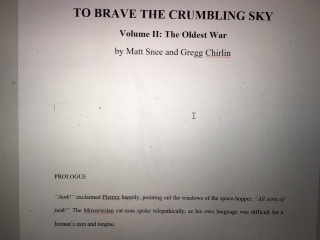
February 21, 2017
The Quest for Perfection
I was just reminded of a great quote: "Perfection is achieved, not when there is nothing more to add, but when there is nothing left to take away."
This is by Antoine de saint-Exupery, writer of the favorite little book, "The Little Prince," among other things.
I think this is the quote I would try to teach most if I taught writing. In the end, it's easy to add more and more to a novel. The writer's mind is always coming up with more stuff. But when you're editing, and rewriting, the key comes to cutting stuff that's superfluous, and this is hard. As Antoine says, the moment you achieve perfection is when you can no longer take anything out no matter what it is.
Obviously, not all writers and all books need to follow this example. Bloated books like Stephen King's "It" and Melville's "Moby Dick" are among my favorite novels. But for myself, this mantra, of cutting, helps me realize what I want to realize without losing my goddamned mind.

